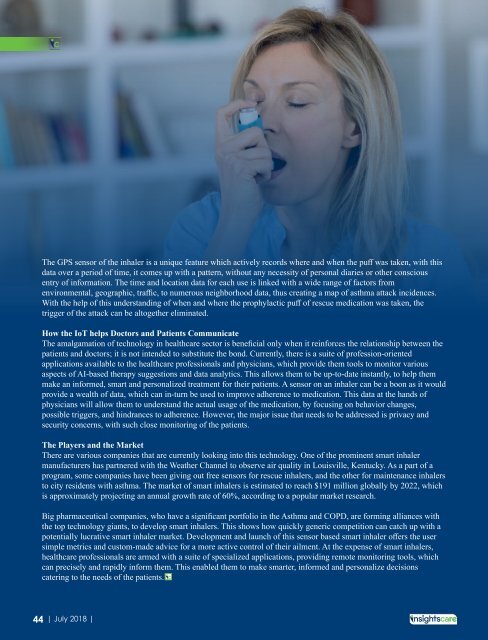The 10 Most Innovative Digital Healthcare Solution Providers 2018
Create successful ePaper yourself
Turn your PDF publications into a flip-book with our unique Google optimized e-Paper software.
<strong>The</strong> GPS sensor of the inhaler is a unique feature which actively records where and when the puff was taken, with this<br />
data over a period of time, it comes up with a pattern, without any necessity of personal diaries or other conscious<br />
entry of information. <strong>The</strong> time and location data for each use is linked with a wide range of factors from<br />
environmental, geographic, traffic, to numerous neighborhood data, thus creating a map of asthma attack incidences.<br />
With the help of this understanding of when and where the prophylactic puff of rescue medication was taken, the<br />
trigger of the attack can be altogether eliminated.<br />
How the IoT helps Doctors and Patients Communicate<br />
<strong>The</strong> amalgamation of technology in healthcare sector is beneficial only when it reinforces the relationship between the<br />
patients and doctors; it is not intended to substitute the bond. Currently, there is a suite of profession-oriented<br />
applications available to the healthcare professionals and physicians, which provide them tools to monitor various<br />
aspects of AI-based therapy suggestions and data analytics. This allows them to be up-to-date instantly, to help them<br />
make an informed, smart and personalized treatment for their patients. A sensor on an inhaler can be a boon as it would<br />
provide a wealth of data, which can in-turn be used to improve adherence to medication. This data at the hands of<br />
physicians will allow them to understand the actual usage of the medication, by focusing on behavior changes,<br />
possible triggers, and hindrances to adherence. However, the major issue that needs to be addressed is privacy and<br />
security concerns, with such close monitoring of the patients.<br />
<strong>The</strong> Players and the Market<br />
<strong>The</strong>re are various companies that are currently looking into this technology. One of the prominent smart inhaler<br />
manufacturers has partnered with the Weather Channel to observe air quality in Louisville, Kentucky. As a part of a<br />
program, some companies have been giving out free sensors for rescue inhalers, and the other for maintenance inhalers<br />
to city residents with asthma. <strong>The</strong> market of smart inhalers is estimated to reach $191 million globally by 2022, which<br />
is approximately projecting an annual growth rate of 60%, according to a popular market research.<br />
Big pharmaceutical companies, who have a significant portfolio in the Asthma and COPD, are forming alliances with<br />
the top technology giants, to develop smart inhalers. This shows how quickly generic competition can catch up with a<br />
potentially lucrative smart inhaler market. Development and launch of this sensor based smart inhaler offers the user<br />
simple metrics and custom-made advice for a more active control of their ailment. At the expense of smart inhalers,<br />
healthcare professionals are armed with a suite of specialized applications, providing remote monitoring tools, which<br />
can precisely and rapidly inform them. This enabled them to make smarter, informed and personalize decisions<br />
catering to the needs of the patients.<br />
44 | July <strong>2018</strong> |
















